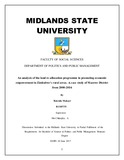Please use this identifier to cite or link to this item:
https://cris.library.msu.ac.zw//handle/11408/3407| Title: | An analysis of the land re-allocation programme in promoting economic empowerment in Zimbabwe’s rural areas: a case study of Mazowe District from 2000-2016 | Authors: | Makayi, Tatenda | Keywords: | Individualism Communities Economic empowerment Land reform |
Issue Date: | 2017 | Publisher: | Midlands State University | Abstract: | In the bid and desire to revise the uneven ownership of productive possessions so the coming of the land re-allocation programme which came in phases of implementation. The aim of this initiative is to increase the role played by the previously marginalised population in the mainstream economy and correct imbalances in land ownership construed as major cause of vulnerability and obstruction to economic growth and development of the larger population of Zimbabwe. The research was carried out in Mazowe District, which is a farming economy laying in region IIA and B, pursuing the land re-allocation programme on its economic empowerment form on indigenous black majority from all foreign owned farms in the District. The main thrust of the research was to establish the economic empowerment impact of the Fast Track Land Reform Programme which was launched in July 2000 supported by the Land Acquisition Act of 1992 and the Amendment number 16A of the former Constitution in April 2000 (Sachikonye 2003). The study was purely a mixed methods model in nature and the data soliciting techniques included questionnaires and in-depth interviews. Through the literature review a lot of secondary publications have shown less support for the policy, with a likely differing outlook from the government owned publications. The research findings reviewed that people in Mazowe District applauded the policy, since it seeks to make them owners of the land in their communities that have been benefiting, the farmer mostly. However a large sample of the respondents that were surveyed expressed that they haven’t benefited from the policy, citing that the policy has been politicised by many bureaucrats in politics and power games. Through the results acquired from the community, the research reviewed that there is need for the government to strengthen institutional structures that monitor land reform and economic empowerment form of this initiative in order guarantee that the major objectives of land policy are achieved and it is also vital that the high politicisation of the land reform policy be detached from individuals whose political adherence has been declared in public. The research findings led to a conclusion that much of the respondents have expressed support in economic empowerment through land reallocation in Zimbabwe, but do not support the individualism engraved in the policy as it is creating some sense of enormity in communities. | URI: | http://hdl.handle.net/11408/3407 |
| Appears in Collections: | Bachelor Of Science In Politics And Public Management Honours Degree |
Files in This Item:
| File | Description | Size | Format | |
|---|---|---|---|---|
| chapter 1-5 full dissertation-tatenda makayi.pdf | Full Text | 974.26 kB | Adobe PDF |  View/Open |
Page view(s)
134
checked on Mar 2, 2026
Download(s)
104
checked on Mar 2, 2026
Google ScholarTM
Check
Items in MSUIR are protected by copyright, with all rights reserved, unless otherwise indicated.



